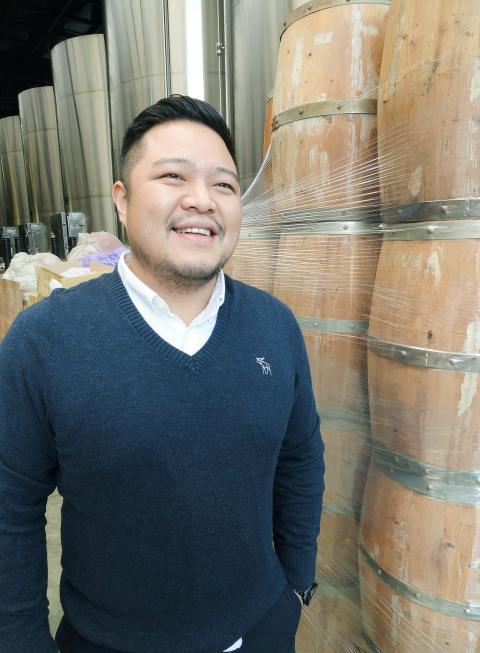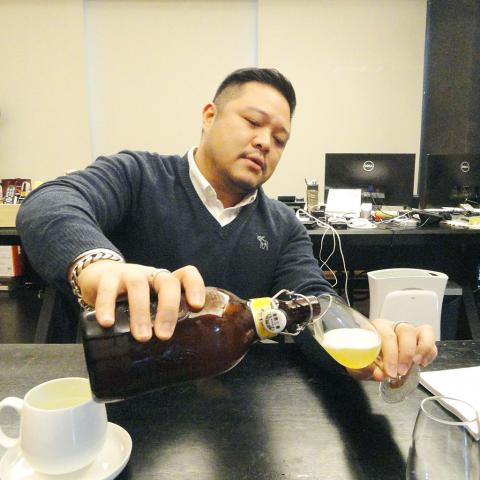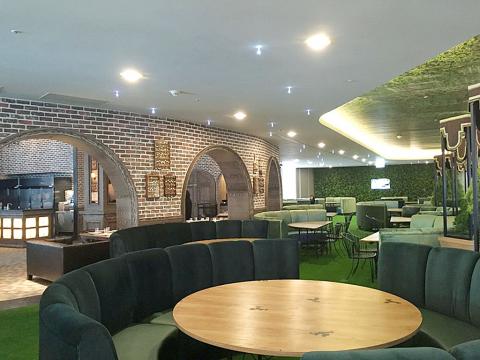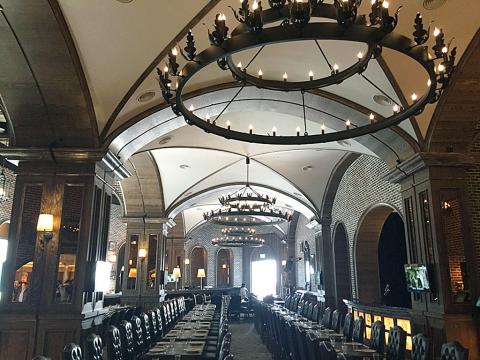One Taiwanese entrepreneur who is leading his company successfully through the uncertain economic environment this year is Quentin Yeh (葉冠廷), CEO and chief brewmaster of the Taipei-based Long Win Group (龍運集團). The corporation consists of Le Ble D’or Microbrewery Restaurants (金色三麥連鎖餐飲) and Long Sun Brewing Co, Ltd (龍昇酒業股份有限公司).
Last year, the business group saw its best year, with NT$800 million (US$25.2 million) in sales. Seventy percent of that figure was generated by the restaurants, and 30 percent by beer sales (800,000 liters) to distributors. The group opened its eighth restaurant in Suzhou, China, where the country’s largest brewpub is finding enthusiastic acceptance. Yeh recently opened Le Ble D’or restaurants in Taipei and Tainan, and he plans international growth in the future.
Yeh says the company began from humble beginnings. In 2002, Long Sun Brewing Co was established by Quentin’s father, Michael Yeh (葉榮發), after the government abolished its monopoly on tobacco and alcohol products as a condition for joining the WTO. They were the nation’s first microbrewery, where the beer market had long been dominated by one Taiwanese brewing company, and several well-known imported beers. Competing head on seemed daunting, which is why they chose to produce microbrewed beer, focusing on quality over profitability by brewing unfiltered, unpasteurized crafted beer to retain a more pure, natural flavor and freshness. The Yeh family bet that “connoisseur” beers would be welcomed because Taiwanese were developing more sophisticated tastes.

Photo: Tony Coolidge
FINDING A MARKET
The Yeh family wanted to originally sell their beer to local restaurants, but it was difficult to gain brand recognition and acceptance unless customers had the opportunity to taste it for themselves. They decided to open their own brewpub as a way to promote their brand, and the Le Ble D’or restaurant was born. The company now has 10 restaurants presenting a wide range of European cuisine in a lively German-themed setting. The menu quality is high and consistent, while the portions are hearty, promoting sharing of dishes and camaraderie. For most customers, however, the most impressive draw is the beer.
“We’re selling an experience,” Quentin Yeh said when asked about the company’s success. “We wanted to include all five senses in the presentation of the restaurant.”

Photo: Tony Coolidge
Yeh added that it helped to have a dynamic and flexible team. Indeed, the CEO has capitalized on his team’s ability to adapt a European concept to Taiwanese tastes, and adjust it again for their expansion into China.
UNIQUE TAIWANESE FLAVOR
Although he is satisfied with the success of his restaurants, the chief brewmaster’s heart is dedicated to the craft of beermaking. A chance meeting with Edward Wang (王德華), an executive of Microsoft’s Taiwan branch in 2007, had a big impact on the direction of the brewery’s evolution. The Microsoft executive praised the Le Ble D’or beer as an excellent “me too” accomplishment, mimicking the great beers of Europe. But he challenged Quentin Yeh to discover what he could provide to the marketplace that would be his “me only” claim to uniqueness, to put his beer on the world map.

Photo: Tony Coolidge
After experimenting with many fruits and flavorings, Yeh chose longan honey as the uniquely Taiwanese flavor for his signature beer. With the help of a recently-hired German brewmaster, Yeh has steered the perfecting of the Le Ble D’or brewing process — one that has clearly paid off. At his office, he proudly displays numerous international beer awards which were won between 2009 and 2014. The most notable was the silver medal from the 2014 European Beer Star held in Germany, which he described as “the Superbowl of beer competitions.” His creations have also won a silver medal and a gold medal in the 2014 International Beer Cup in Japan as well as a gold medal in the 2014 World Beer Cup held in Denver, Colorado.
The Yeh family’s business strategies have included providing a European culinary experience to an increasingly sophisticated Taiwanese marketplace, and the company has remained flexible to adapt to changing Taiwanese tastes. As for its future, the Win Long Group will likely open a few more restaurants in Taiwan, including Kaohsiung, Hsinchu and Taoyuan. They will also open a brewpub in Taipei where diners can brew their own beer and take beer brewing lessons.
With its current brewery capable of producing 1.2 million liters of beer annually for its Taiwanese market, the company plans to build a second brewery capable of meeting an annual international demand of over 20 million liters within the next two years, expand into the Asian continent within three to five years and take their products global within five to 10 years.

Photo: Tony Coolidge
Signs look good that this family-owned enterprise will be able to achieve its ambitions. The company’s sales are driven by the efforts of its creative marketing team, which has developed an effective branding campaign in Taiwan.
According to an article in last November’s Business Today Magazine (今周刊), Le Ble D’or ranks third in brand recognition. Not bad for a confident and flexible young company that is not afraid to take on established corporate heavyweights. According to its own survey, 40 percent of respondents in Taiwan said the Le Ble D’or brand was their favorite beer. Are these taste test results impartial and accurate? Quentin Yeh challenges you to taste a chilled glass of his beer and judge for yourself.
For more information, visit: www.lebledor.com.
Warning: Excessive consumption of alcohol can damage your health.

In the March 9 edition of the Taipei Times a piece by Ninon Godefroy ran with the headine “The quiet, gentle rhythm of Taiwan.” It started with the line “Taiwan is a small, humble place. There is no Eiffel Tower, no pyramids — no singular attraction that draws the world’s attention.” I laughed out loud at that. This was out of no disrespect for the author or the piece, which made some interesting analogies and good points about how both Din Tai Fung’s and Taiwan Semiconductor Manufacturing Co’s (TSMC, 台積電) meticulous attention to detail and quality are not quite up to

April 21 to April 27 Hsieh Er’s (謝娥) political fortunes were rising fast after she got out of jail and joined the Chinese Nationalist Party (KMT) in December 1945. Not only did she hold key positions in various committees, she was elected the only woman on the Taipei City Council and headed to Nanjing in 1946 as the sole Taiwanese female representative to the National Constituent Assembly. With the support of first lady Soong May-ling (宋美齡), she started the Taipei Women’s Association and Taiwan Provincial Women’s Association, where she

Chinese Nationalist Party (KMT) Chairman Eric Chu (朱立倫) hatched a bold plan to charge forward and seize the initiative when he held a protest in front of the Taipei City Prosecutors’ Office. Though risky, because illegal, its success would help tackle at least six problems facing both himself and the KMT. What he did not see coming was Taipei Mayor Chiang Wan-an (將萬安) tripping him up out of the gate. In spite of Chu being the most consequential and successful KMT chairman since the early 2010s — arguably saving the party from financial ruin and restoring its electoral viability —

It is one of the more remarkable facts of Taiwan history that it was never occupied or claimed by any of the numerous kingdoms of southern China — Han or otherwise — that lay just across the water from it. None of their brilliant ministers ever discovered that Taiwan was a “core interest” of the state whose annexation was “inevitable.” As Paul Kua notes in an excellent monograph laying out how the Portuguese gave Taiwan the name “Formosa,” the first Europeans to express an interest in occupying Taiwan were the Spanish. Tonio Andrade in his seminal work, How Taiwan Became Chinese,